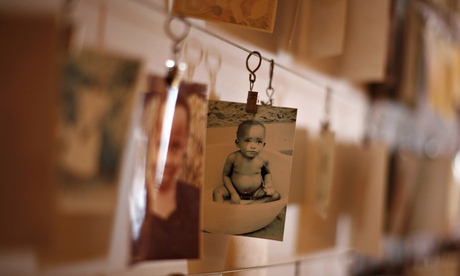Source: The Guardian
Rwanda has gone from a disaster zone to a country determined to move on – and it's women driving forward the peace process.
Gaspard, the taxi driver taking me back to my hotel after dinner, is 27. So he was just a boy in 1994.
You find yourself asking everyone here in Rwanda their age – and then doing a quick sum, to work out how old they would have been 20 years ago.
Back then, Gaspard lived with his family near the border with the Democratic Republic of Congo. "Killed," he says, starkly. "My mother. Killed. My father. Killed. Only my little sister and me left." They live in Kigali now, the thriving capital of Rwanda. His sister is studying and Gaspard is finally able to drive past the roadblocks without fear. When Gaspard was seven, roadblocks meant death. In April 1994, within an hour of then-president Juvénal Habyarimana's death when the aeroplane he was in was shot down, the killings started. "If the police stopped you, they killed you," he says.
On this warm July evening, the roads in Kigali are blocked only because the president, Paul Kagame, is in town. In the past two decades, Rwanda has changed from a devastated, post-genocide disaster zone into a country determined to rebuild and move on, economically, politically and socially.
Leadership has been crucial. Much of the debate at this week's Women in Parliaments summer summit in Rwanda has focused, inevitably, on the impact of having more women in public leadership roles. After the genocide, 70% of the remaining population were women and they played a key role in the vital peace and reconciliation process. This is the only country in the world with more women than men in parliament and the 100 female parliamentarians from 49 different countries at this conference are here to learn how they, too, might be able to increase their own female representation.
Alongside discussion about the mechanics of getting more women into leadership roles is the equally important debate that will be familiar to UK-based public leaders: how to gather the evidence of the impact of female leadership and embed it in policy-making.

Rwanda has changed from a devastated, post-genocide disaster zone into a country determined to rebuild.
Photograph: Jason Reed/Reuters
MEP Silvana Koch-Merin, the founder of the Women in Parliaments group, tells the conference that empowering women would see global GDP rise by 27% and that giving women a voice in peace-making is equally important. "That would truly change the world," she says, a sentiment echoed by many of the speakers. Women do not want to be seen as passive victims of war and are asserting their right to be decision-makers about peace.
Lamin Manneh, UN resident co-ordinator in Rwanda, adds a cautionary note, saying that simply having a high number of female MPs does not "necessarily translate into the dividends we require". But it does provide a strong foundation, he adds. In Rwanda, that includes more property rights for women, and protection against violence.
Another warning comes from Southern Sudan. Anne Itto Leonardo, a minister of the southern Sudan parliament says that political progress is at risk of being undermined by conflict. "We could lose all the gains we have made," she says. For politicians like Leonardo there is a clear lesson: "Women need to lead the change we want to see."
But there is another aspect of empowering women, which is the crucial need to convince existing political leaders, still, of course, mainly men, of the need for change. Here in Rwanda, that includes the importance of support from president Kagame. There's a picture of him after the October 2013 election, in which 64% of the parliament voted in were women. It's a Rwandan version of former Labour leader Tony Blair's babes, only more of them – and with a hope of bringing about lasting social change
